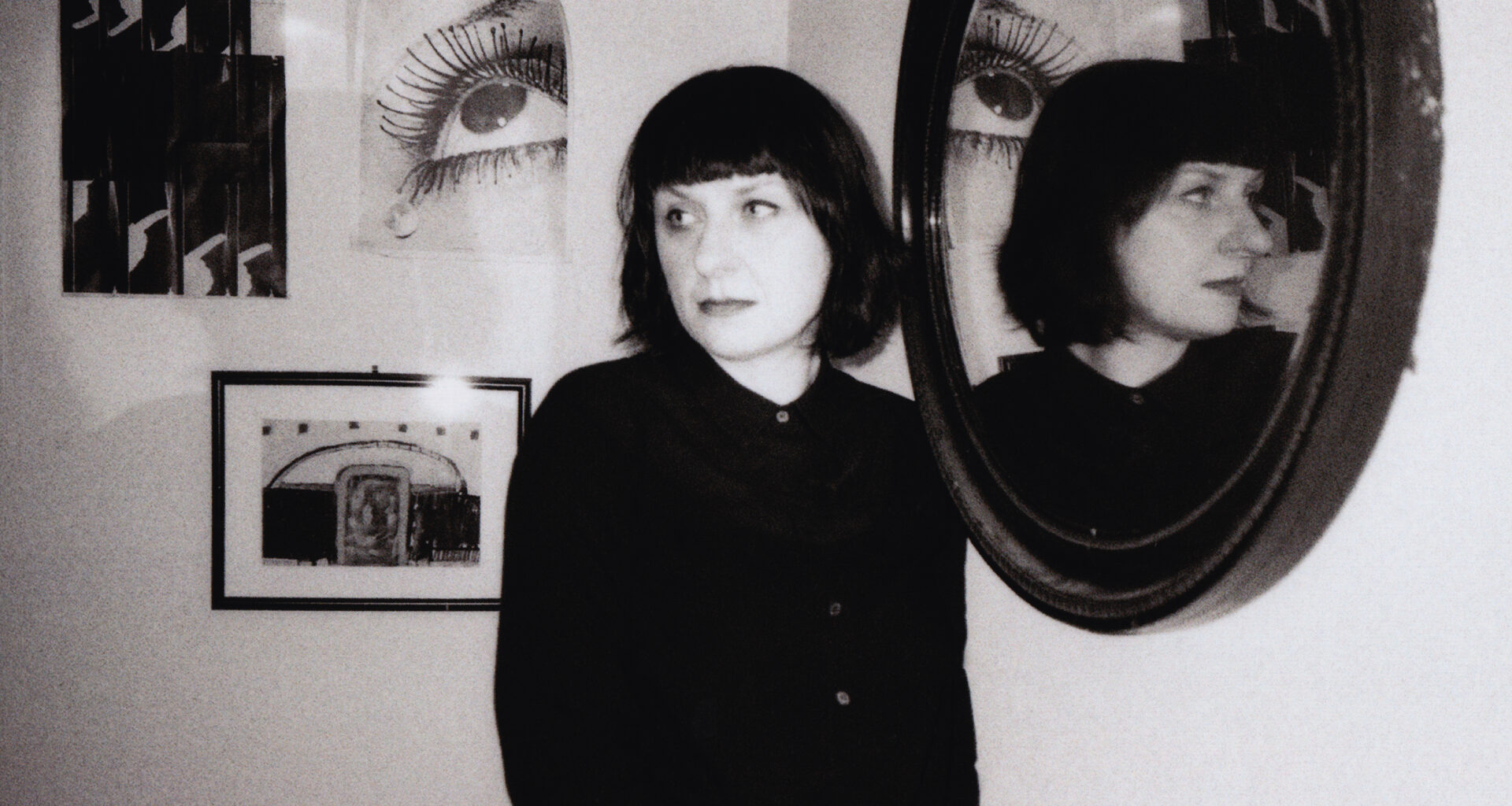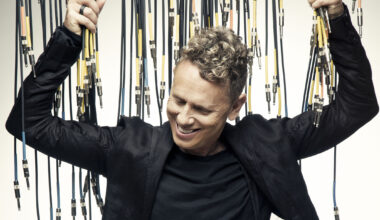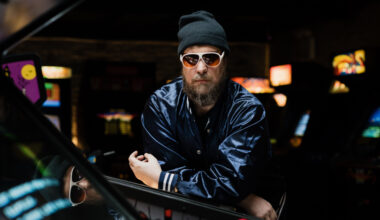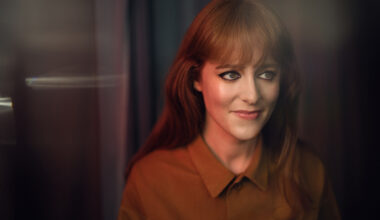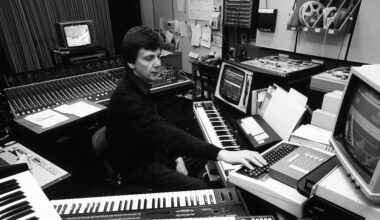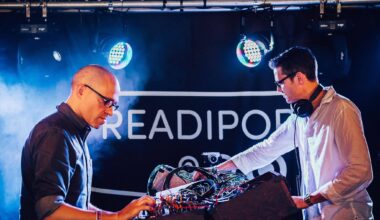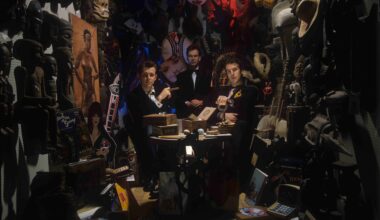With the release of a retrospective of her melancholy collage-pop, Glasgow-based, Polish-born Ela Orleans tells us about the connections between concussion, creativity and catharsis
Poland, 1982. It’s nine months into martial law, the Communist government’s crackdown on pro-democracy forces. In Oświęcim (better known by its German name, Auschwitz), the police are everywhere, and a strict curfew is in place. But life goes on. A little girl is playing with her friends. They’ve chalked a square on a building. The game: to see who can touch it first. Elżbieta races off, and is quickest to make contact… by tripping on the kerb and banging her head on the wall, knocking herself out. A 10-day stay in hospital results.
For Ela Orleans (the surname’s real, though acquired through marriage), that trip was a fateful moment. She’s convinced that without it, she’d never have become a musician – at least, not of the electronic variety.
“I went to music school when I was eight, and was there for four years,” says Orleans. “But then I had to resign, because I got concussion. Within a year, I had to return my violin and give up music, after passing out during orchestra practice. Otherwise I’d probably have continued being a musician, but in the sense of someone who plays somebody else’s pieces, and a mediocre one, because I’m terrible at playing instruments.”
That injury put her on a path she’s followed through two decades of musical self-expression. Her latest record, ‘Movies For Ears’, collects songs from eight entries in her solo discography, from 2009’s ‘Lost’ to 2012’s ‘Tumult In Clouds’. Showcasing the poppier side of her back catalogue, its 13 tracks were selected partly according to the popularity of YouTube videos and streams, and partly how much dancing they inspire when played live.
“It’s the best thing when it happens,” she says. “I like people to be happy when they’re listening to music. I don’t want to depress them, even with songs about crappy things, like a broken heart. We have to stay laughing.”
Not that this is the sort of pop that gets playlisted on Radio One. There’s a nostalgic quality to Orleans’ music. It’s often built on a loop that can be difficult to date: you may struggle to identify whether she’s sampled something from the 50s or 60s (sources she confesses include Ennio Morricone, Joe Meek and Polish blues rock band Breakout), or built something herself which sounds authentically of a bygone era. And while Orleans’ ethereal harmonies speak of deep emotion, there’s also a detached quality to her vocals. It’s as if they’ve been picked up by SETI, as they search for transmissions from beyond the stars.
The likes of Broadcast, Stereolab and Nico tend to get referenced in the same breath, the latter all too predictably given that Orleans is a woman with a continental accent. The artist herself feels her work is influenced by all manner of things – the children’s songs she grew up listening to; the jazz she studied at music school; singing harmonies in choir. Then there’s the post-punk and reggae records she spun as an art school kid, hair mussed-up with Nivea (“I was a secret teenage punk, because I didn’t want to upset my mum!”), or songs like Roy Orbison’s ‘In Dreams’ (“very dramatic and beautiful and romantic”). The list goes on.
“The only music I don’t particularly like is rock,” she says. “It’s just whenever there’s something in the rhythm and melody that grabs me and makes me want to hum it. I like to hum things, I could spend the whole day humming. But for sure, reggae, dub and even jungle made a huge impact on the way I want to treat music. I just want it to sound different, because I like music when it’s unique and stands out. And I like music I can listen to many times and always discover something new.”
As a musician, Orleans was a late bloomer, though she’d long nursed a belief that crafting songs was something she had a knack for.
“I’d listen to Nick Drake or Leonard Cohen, and make a melody on top of their melody,” she says. “So I thought, ‘I could easily do that’. I just wasn’t sure how. When I was growing up, there was no means to do that without having a producer who’d take you to the studio, record it, and pay for everything. Now it’s very easy.”
After moving to Glasgow in the late 90s, she got a hankering to take up the violin again, and bought one. As she was walking down the road with the instrument, a friend spotted her from a window, and invited her to play at a gig. This led to Orleans working with experimental pop band Hassle Hound, latterly, after she relocated, sending in her contributions from Warsaw, then New York. Gradually, she grew frustrated at not having more say in decision-making.
“I started to develop a very clear vision of how I want to sound,” she says. “When you’re playing with other people, you have to compromise. I wasn’t willing to. That’s when I decided to start working solo.”
The first fruits of that decision, ‘Walkingman’ (recorded in 2000, but not released until 2011) can be heard on ‘Movies For Ears’. With its plodding rhythm and depressive lyrics (“I’m walking alone / Weather’s OK / There is no sun / There is no time / There is no friends”), it is comically downbeat. Piecing it together, Orleans developed a process she still follows today.
“First I’d be reading something, or see a photograph, or a film,” she says. “Then I’d make notes while I was watching or reading, add something personal to it. Then I’d record little rhythms and patterns, and try to sing over them.”
Next she builds up layer upon layer of sound, sometimes scores of them.
“I build the rhythm parts, so they serve like a metronome,” she says, “then develop more and more tiny annoying things on top. So there’ll be a little bit of found sound, or radio waves, like when you’re searching for a station.”
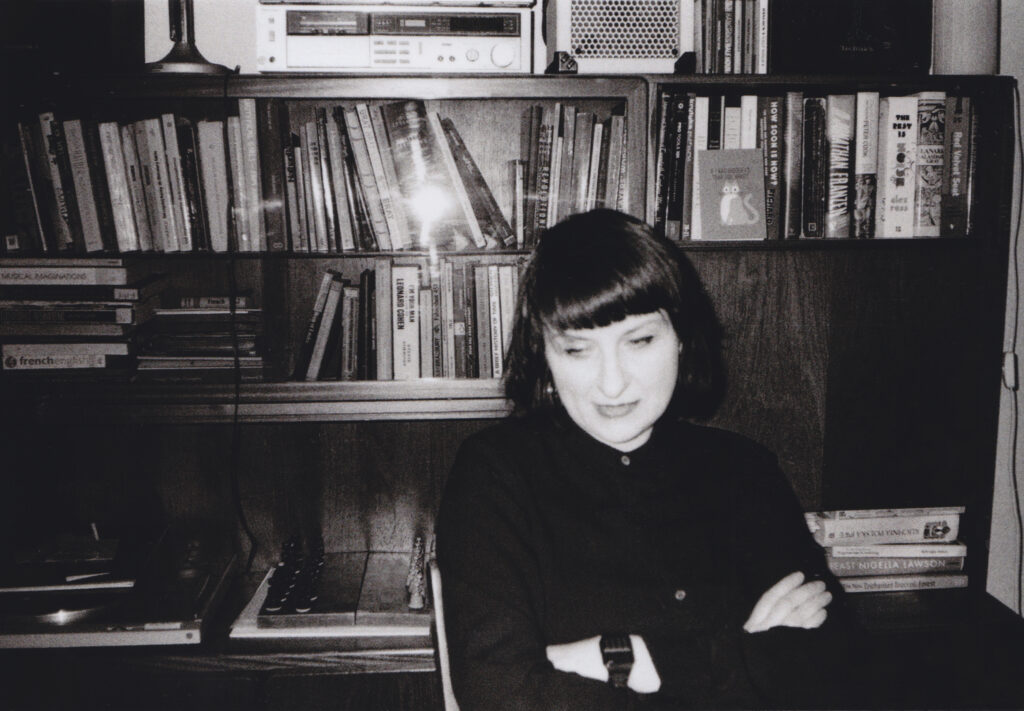
She imitates the hisses and howls you get spinning the AM dial, just the sort of noises featured in ‘Walkingman’.
“I love that sound,” she laughs. “When I was a kid, I’d spend hours doing that, until my sister would hit me, or somebody would throw something at me.”
Orleans puts this fascination down to the same concussion that led to her handing in her Stradivarius.
“After that there were huge changes in my hearing,” she says. “I started to love certain sounds that other people found appalling. Sounds you hear riding the train. Sounds of construction, or drilling. So that’s probably where my fascination with noise comes from.”
She believes that childhood accident also informs the general timbre of her sound.
“I just love noise,” she says. “Slick sound makes me kind of ill, I think that’s why I like punk, but I’ll also listen to chansonniers from the 1920s, because the voice has a different sound form. It’s as if someone was singing through the phone.”
Which is pretty much what she was doing when she recorded all the tracks on ‘Music For Ears’…
“During those years, I had access to good microphones, and tried singing into them,” says Orleans. “It was fine, but just not me. Then I was talking to my mum on Skype and forgot to take my Skype headset off. I went back to GarageBand, started singing, and thought, ‘Oh my god… this is my microphone.’”
Nowadays she has to recreate the effect using software, since that very basic headset broke.
“I bought a new one, and they’re not as good,” she says. “Bloody hell, why do they improve things?”
While ‘Walkingman’ sprang directly from Orleans’s imagination, other key tracks on the LP were inspired by particular bands. Take 2011’s ‘Neverend’. Penned when Orleans was living in New York, but, due to the cost of US healthcare, resigned to having to leave, it sounds like a love song, but is actually a farewell to the city.
“It was a frame on all my experiences in New York,” she says. “It was the end of a dream, that I found a place where I can be happy. I remember hearing ‘New York, I Love You, But You’re Bringing Me Down’ by LCD Soundsystem and thinking, ‘This is how I want this to feel’.”
Another selection that’s particularly important to Orleans, 2012’s ‘The Season’, was inspired by a Factory Records outfit.
“I was listening to ‘Flight’ by A Certain Ratio over and over at the time, and I wanted my guitar to sound exactly like that,” she says.
This particular song represents an important personal landmark.
“That was the first time I didn’t need to sample. Instead, I moved my imagination, and was able to achieve something without any crutches.”
While Orleans has moved away from sampling on her three subsequent albums – partly as it’s “more creative, more respectful”, but also for practical reasons (“I’m a bit afraid of the rights problems”), she has no qualms about using other pre-existing sources. The lyrics of ‘The Season’, for example, draw on two works by 19th century French poet Arthur Rimbaud. Other tracks on ‘Movies For Ears’ borrow from Emily Dickinson and Elizabeth Barrett Browning.
“If I’m looking for something very personal, I wouldn’t use my own words,” is her seemingly paradoxical explanation. “I would feel exposed. Hiding behind somebody else’s lyrics is much safer. I can always say, ‘Oh, it’s not about me, it’s just a poem by Sara Teasdale, who was suicidal’.”
Besides, when she does supply her own words, they can be misconstrued. She cites 2016’s ‘Ghosts And Whispers’ (sample lyric: ”I watched the lightning tear the sky apart / Silver sky was breathing out the ghosts of clouds”).
“Everyone said it was the most cheerful song I’ve ever done, but the lyrics are about suicide. It reminded me of my exam for drama school, when I did a monologue by Lady Macbeth, and everybody laughed.”
As those references to suicide suggest, Orleans has struggled through some difficult times. During her darkest hours, making music has been a great comfort. She goes so far as to say that ‘Tumult In Clouds’, her 2012 LP, “probably saved my life”.
“It’s the reason I got that violin,” she says, “because I needed some sort of catharsis. I needed to make some noise. I think it was Chekhov who said that some people like themselves in art, and some people like art in themselves, I’m definitely the latter. Even when I’m struggling with financial or psychological troubles, I feel very privileged and rich because I have music.”
She can’t imagine ever quitting and getting a proper job, then?
“I’d seriously rather die!” she gasps, horrified. “No. I could stop selling music, but I couldn’t stop making it. It’s just impossible.”
But what will she be making next? The way she talks about ‘Movies For Ears’, its release seems to represent the closing of a chapter.
“It’s 10 years since the release of ‘Lost’,” she says. “So maybe it’s a good time to move forward.”
In recent years, Orleans has been concentrating increasingly on commissions to score documentaries, or animated shorts, or perform live scores for silent movies (during her time in NYC, she took part in a film scoring programme mentored by revered US composer David Shire). She’s also eager to put her talents to use in ways that are more socially engaged.
“I want to make change,” she says. “I’m quite idealistic about how art should influence the way the world exists, so I’m trying to involve myself in LGBT rights, or freedom of speech in Poland.”
Most recently, she’s drawn on the verse of Zuzanna Ginczanka, a Polish-Jewish poet executed by the Nazis, to write songs for a new play, ‘Wróg Się Rodzi’ (’Foe Is Born’). That’s proving highly controversial in her homeland, as it equates ultra-conservative Catholic radio station Radio Maryja with the propaganda stations which fanned the flames of the Rwandan genocide.
“Being an artist is a privilege. I shouldn’t be taking it for granted, I should offer something back to society as well,” she pauses, suddenly realising how earnest she sounds, and laughs. “But that’s boring stuff, a bit too serious. It doesn’t mean I’ll stop making pop songs. You can still dance. You can still rave.”
‘Movies For Ears’ by Ela Orleans is out on Night School
